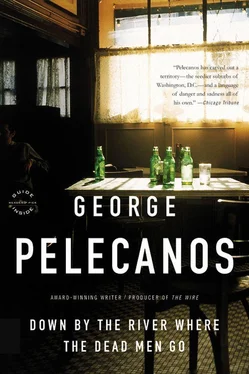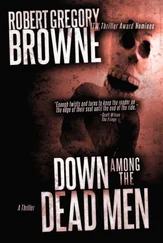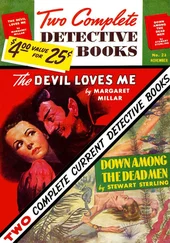George Pelecanos - Down By the River Where the Dead Men Go
Здесь есть возможность читать онлайн «George Pelecanos - Down By the River Where the Dead Men Go» весь текст электронной книги совершенно бесплатно (целиком полную версию без сокращений). В некоторых случаях можно слушать аудио, скачать через торрент в формате fb2 и присутствует краткое содержание. Жанр: Криминальный детектив, на английском языке. Описание произведения, (предисловие) а так же отзывы посетителей доступны на портале библиотеки ЛибКат.
- Название:Down By the River Where the Dead Men Go
- Автор:
- Жанр:
- Год:неизвестен
- ISBN:нет данных
- Рейтинг книги:5 / 5. Голосов: 1
-
Избранное:Добавить в избранное
- Отзывы:
-
Ваша оценка:
- 100
- 1
- 2
- 3
- 4
- 5
Down By the River Where the Dead Men Go: краткое содержание, описание и аннотация
Предлагаем к чтению аннотацию, описание, краткое содержание или предисловие (зависит от того, что написал сам автор книги «Down By the River Where the Dead Men Go»). Если вы не нашли необходимую информацию о книге — напишите в комментариях, мы постараемся отыскать её.
Down By the River Where the Dead Men Go — читать онлайн бесплатно полную книгу (весь текст) целиком
Ниже представлен текст книги, разбитый по страницам. Система сохранения места последней прочитанной страницы, позволяет с удобством читать онлайн бесплатно книгу «Down By the River Where the Dead Men Go», без необходимости каждый раз заново искать на чём Вы остановились. Поставьте закладку, и сможете в любой момент перейти на страницу, на которой закончили чтение.
Интервал:
Закладка:
I dropped my card through the mail slot in the door and walked back down to the street.
Division Liquors stood on a corner a couple of blocks south of the Lewis house, between an empty lot and the charred shell of something once called the Strand Supper Club. Two other businesses on the block had burned or been burned out as well, leaving only the liquor store and a Laundromat open on the commercial strip. I parked in front of the Laundromat and walked towards Division Liquors.
Several groups of oldish men stood in front ocard in frf the store, gesturing broadly with their hands and arguing dispassionately, while a young man stood next to his idling Supra and talked into a pay phone mounted on the side of the building that faced the lot. The young man wore a beeper clipped to his shorts-some sort of statement, most likely meaning nothing-and swore repeatedly into the phone, punctuating each tirade with the words my money. I passed a double amputee sitting in a wheelchair outside the front door. His chair had been decorated with stickers from various veteran’s groups and a small American flag had been taped to one of its arms. The man sitting in it had matted dreadlocks tucked under a knit cap, with sweat beaded on the ends of the dreads.
“Say, man,” he said.
“I’ll get you on the way out,” I said, and entered the store.
I grabbed two cans of beer and a pack of Camels, paid a white man through an opening at the bottom of a Plexiglas shield, and left the store. Out on the sidewalk, I slipped a couple of ones and some coin into Knit Cap’s cup, checked to see if the young man was still using the phone, saw that he was, and walked back to my car. Sometime later, as I finished off my first can of beer, the young man dropped into the bucket of his Supra and drove off. I got out of my car and walked to the pay phone, where I sunk a quarter in the slot and punched in a number that was written on the notepad in my hand.
“Mrs. Jeter, please.”
A bored young female said, “Hold on.” A television set blared in the background, competing against the sounds of young children yelling and playing in the room. A woman’s voice screamed out, silencing the children. She breathed heavily into the phone.
“Yes?”
“Mrs. Jeter?”
“Y-y-yes?”
“My name is Nick Stefanos. I’m working with the Metropolitan Police on your son Calvin’s murder,” I said, breaking some kind of law with the lie.
“I’ve done talked to the p-p-police three times.”
“I know. But I’d like to see you if possible. I’m in your neighborhood right now.” I gave her the name of the liquor store.
“You’re in the neighborhood all right. Fact, you’re just around the corner.” I listened to the TV set and the kids, who had started up again, as she thought things over. She told me how to get to her place.
“Thanks very much. I’ll be right there.” After I shotgun another beer, I thought, hanging the phone in its cradle.
The Jeter apartment was in a squat square structure housing five other units, oddly situated on a slight rise in the middle of a block of duplex homes. I parked in a six-car lot to the right of the building, beside a green Dumpster filled to overflowing with garbage. Bees swarmed around a tub-sized cup of cola abandoned on top of the Dumpster, and two boys stood nearby on brown grass and swung sticks at each other in the direct sun. I finished my beer, popped a stick of gum in my mouth, locked my car, and walked acros
A woman sat in a folding chair outside the entrance, her huge legs spread, the inside of each wrinkled thigh touching the other, fanning herself with a magazine. Some kids stood out on the street, grouped around an expensive black coupe, the name MERCEDES scripted along the driver’s side rocker panel. Bass boosted and volumed to distortion thumped from the sound system, burying the rap. A kid looked my way and spread his fingers across his middle, and one of his friends smiled. I approached the woman and asked her the number of the Jeter apartment. A wave of the magazine directed me to a dark opening centered in the front of the building.
The Jeter apartment was one of two situated down the stairs. The stairwell smelled of urine and nicotine, but in the depth and insulation of the cinder block, things were cooler and there was less noise. I wiped sweat off my face and knocked on a door marked 01.
The door opened, and a woman who could have been forty or sixty-five stood in the frame. She wore turquoise stretch pants and a T-shirt commemorating the reunion of a family name I did not recognize. Her breasts hung to her belly and stretched out on the fabric of the T-shirt. Her face was round as a dinner plate and her hair was doing different things all at once on different parts of her head. By anyone’s standard, she was an unattractive woman.
“Mrs. Jeter? Nick Stefanos.” I put out my hand.
She took it and said, “C-c-come on in.”
I walked into a living room crowded with a plastic-covered sectional sofa and two nonmatching reclining chairs. Over the sofa, on a pale yellow wall, hung a black blanket embroidered with a fluorescent wild pony. A rather ornate sideboard of cheap material stood against the next wall, with just about a foot of space between it and the sofa. Except for one dusty teacup, the shelves of the sideboard were empty. A big-screen television sat flush on a stand against the next wall, with wires extending from the Sega beneath it, the wires leading to the hands of a young man sitting on the sofa next to a young woman. Around them both, and on the table where the young man’s feet rested, were scattered junk-food wrappers and plastic cups. The young man played the game with intensity, his features twitching with each explosion and laser simulation from the set. As I entered, he glanced up briefly in my direction with a look that managed to combine aloofness with contempt. The young woman, who I guessed had answered the phone when I called, did not acknowledge me at all.
I followed Mrs. Jeter toward the kitchen, looking once into a deep unlit hallway where a little boy and a toddler of indeterminate sex jostled over a rideable plastic fire engine. In the shadows, I saw another young man move from one room to the next.
The kitchen, lit with one circular fluorescent light and a bit of natural light from a small rectangular window, was through an open doorway to the right of the television. Mrs. Jeter leaned against an efficiency-size refrigerator and folded her arms.
“Can I get you somethin’, Mr. Stefanos?”
The heat, oppressive in the living room, was stifling in the kitchen; I rolled my sleeves up over damp forearms to the elbow. “Water. A little water would be great, thanks.”
“H-h-have a seat.”
She gestured to one of four chairs set tightly around a small folding table with a marbleized red Formica top. I sat in one, under a clock whose face featured a Last Supper depiction of white disciples grouped around a white Jesus. Mrs. Jeter turned her back to me, withdrew a glass from a sinkful of dirty dishes, rinsed the glass out, and filled it from the spigot. She placed the glass in front of me and took a seat in a chair on the other side of the table.
Mrs. Jeter watched my face as I looked at the grayish water in the glass, the lip of which was caked yellow. I turned the glass inconspicuously in my hand and had a sip from the cleanest side. The water was piss-warm and tasted faintly of bleach. I put the glass down on the table.
“Mrs. Jeter-”
“Call me Vonda, if you don’t mind. I ain’t all t-t-that much older than you.”
I nodded. “My sympathies on your son’s death, Vonda.”
“Your sympathies,” she said quietly and without malice. “Your sympathies gon’ bring my baby back?”
“No,” I said. “It’s just that… I’d like to help, if I can.” I rotated the glass in the ring of water that had formed beneath it and listened to the sounds of the toddler crying in the hallway and the explosions coming from the game on the television set in the other room.
Читать дальшеИнтервал:
Закладка:
Похожие книги на «Down By the River Where the Dead Men Go»
Представляем Вашему вниманию похожие книги на «Down By the River Where the Dead Men Go» списком для выбора. Мы отобрали схожую по названию и смыслу литературу в надежде предоставить читателям больше вариантов отыскать новые, интересные, ещё непрочитанные произведения.
Обсуждение, отзывы о книге «Down By the River Where the Dead Men Go» и просто собственные мнения читателей. Оставьте ваши комментарии, напишите, что Вы думаете о произведении, его смысле или главных героях. Укажите что конкретно понравилось, а что нет, и почему Вы так считаете.












